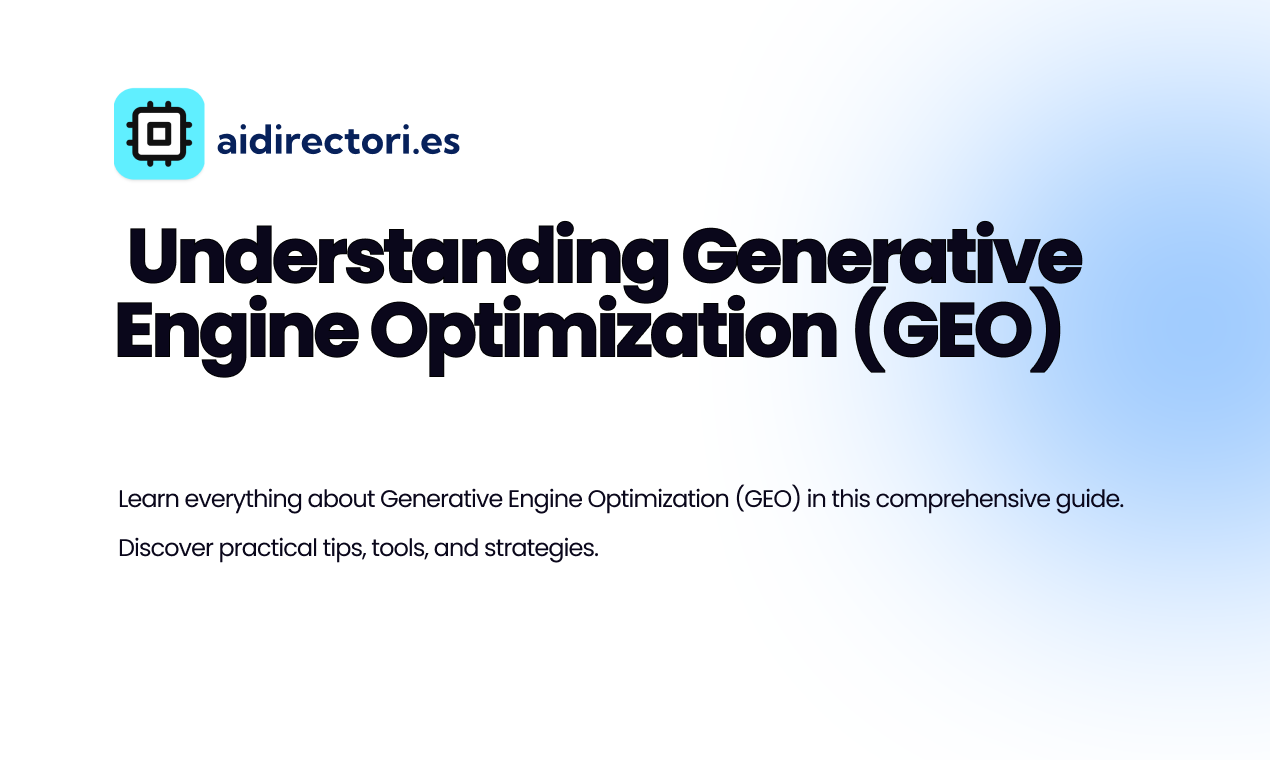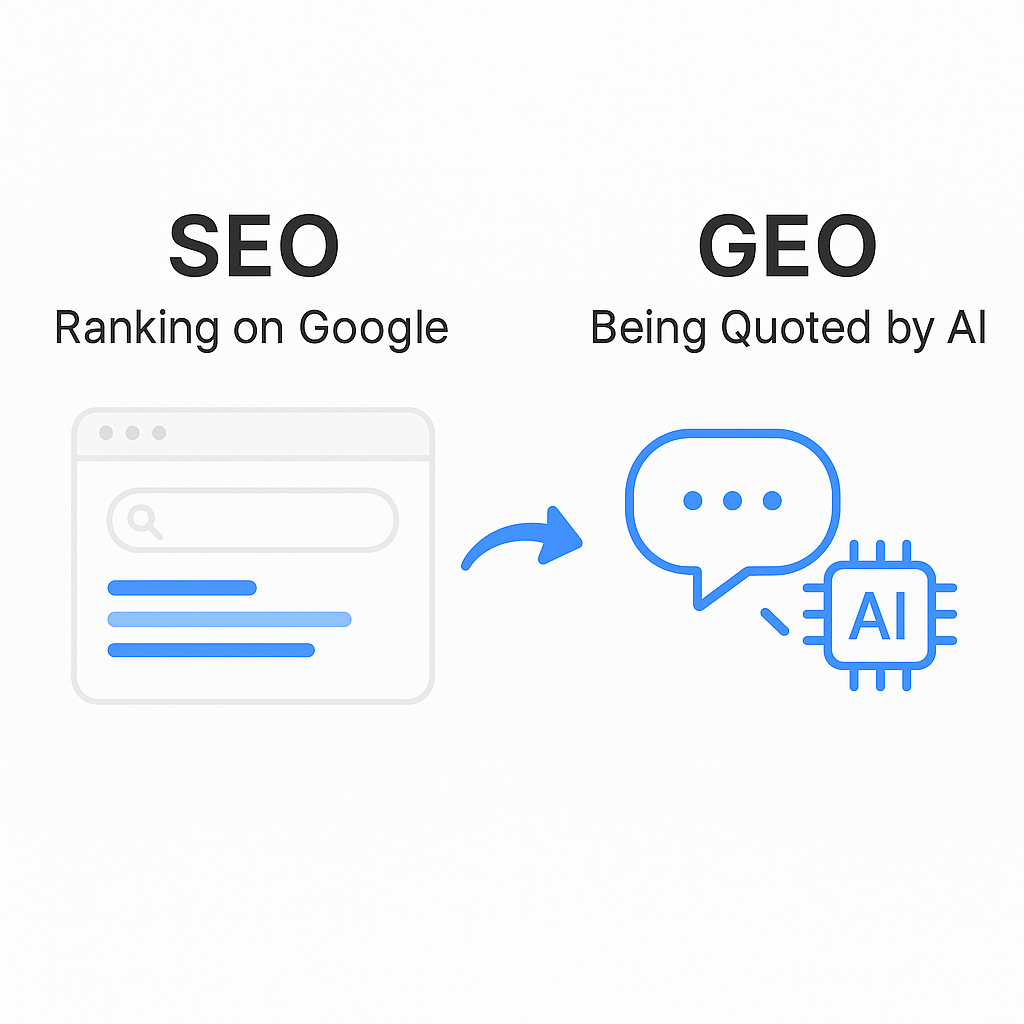Understanding Generative Engine Optimization (GEO)
Learn everything about Generative Engine Optimization (GEO) in this comprehensive guide. Discover practical tips, tools, and strategies.
Posted by
Related reading
Cheap SEO in 2025: 10 Best Tools & Budget Strategies to Rank #1
Top 10 affordable solutions including AI Directories, Ahrefs, Semrush ...
SwiftKey Split Keyboard: Advanced Android Typing with Hidden Features
Advanced gesture typing, custom themes, split keyboard, live translati...
SwissTransfer: Secure File Sharing Platform from Switzerland
Send files up to 50 GB free with no registration. Swiss-based secure s...
Get your own Review
Let us try and review your product.
- ●Rank on "[your_product] review" on Google and earn a strong backlink
- ●Private feedback from our team to improve your product
- ●Strengthen your customer trust

Introduction
Did you know that over 70% of businesses are now using some form of artificial intelligence in their marketing strategies? As the digital landscape evolves, so do the tools and techniques we use to reach customers. One of the most exciting developments is Generative Engine Optimization (GEO), a game-changing approach that leverages AI to enhance content delivery and user engagement.
In this guide, we'll explore what GEO is, how it differs from traditional SEO, and why it’s crucial for businesses looking to thrive in an increasingly competitive market. By the end, you’ll have a solid grasp of GEO and practical strategies to implement it in your own B2B marketing efforts. Ready to dive in?
Understanding Generative Engine Optimization (GEO)
Generative Engine Optimization, or GEO, is a strategy that focuses on optimizing content for generative AI engines. These engines create unique content based on user inputs, significantly changing how businesses connect with their audiences. Unlike traditional SEO, which focuses on optimizing content for search engines like Google, GEO is about ensuring that AI tools can generate relevant, high-quality content tailored to user needs.
The core principles of GEO revolve around understanding user intent, leveraging AI to create personalized content, and optimizing for the specific algorithms that drive generative engines. This approach not only enhances the relevance of the content but also improves user engagement and conversion rates.
GEO vs SEO: Key Differences
 While both GEO and SEO aim to improve visibility and engagement, their approaches are distinct. Here are the key differences:
While both GEO and SEO aim to improve visibility and engagement, their approaches are distinct. Here are the key differences:
- Focus: SEO primarily targets search engine algorithms, while GEO focuses on generative AI engines.
- Content Creation: SEO optimizes existing content, whereas GEO involves creating new content that meets the dynamic needs of users.
- User Interaction: GEO emphasizes real-time content generation based on user queries, allowing for more personalized responses and interactions. Understanding these differences is crucial for businesses looking to stay ahead in their digital marketing efforts.
Why GEO Matters for Your Business
GEO is not just a trend; it’s a fundamental shift in how businesses can engage with customers. Here are a few reasons why it matters:
- Enhanced Personalization: With GEO, businesses can deliver tailored content that meets individual user needs, improving customer satisfaction and loyalty.
- Higher Engagement Rates: Generative content is often more relevant and engaging, leading to better interaction rates.
- Increased Efficiency: Automating content generation can save time and resources, allowing marketers to focus on strategy rather than content creation. In a world where consumers expect personalized experiences, adopting GEO can give your business a competitive edge.
The Three Types of Generative Engines
- Text-based Engines: These engines, like ChatGPT, create written content based on prompts. They can be used for blogs, articles, and even customer support responses.
- Image and Video Generators: Tools like DALL-E generate visuals that can enhance marketing campaigns, making them more engaging and appealing.
- Code Generators: These engines help developers create software applications efficiently. They can provide snippets of code based on user requirements, speeding up the development process. Each type of generative engine serves a unique purpose and can be leveraged in various ways to enhance business operations.
AI Search Engines: A Deep Dive into ChatGPT and Perplexity
Two notable examples of AI search engines are ChatGPT and Perplexity.
- ChatGPT: This model allows users to engage in conversations, answering questions and generating content based on user prompts. It’s useful for businesses looking to enhance customer support or create engaging content quickly.
- Perplexity: This AI search engine takes a different approach, focusing on delivering concise, accurate answers to user queries. It’s designed to improve the search experience by providing direct information rather than links to external content. Both engines can significantly impact how users search for information, making it essential for businesses to understand their functionalities and how to optimize content for these platforms.
Implementing GEO Strategies in Your B2B Marketing
To successfully integrate GEO into your B2B marketing strategy, consider these practical tips:
- Identify User Intent: Understand what your audience is searching for and tailor your content to meet their needs.
- Leverage AI Tools: Use AI-based content generation tools to create relevant and engaging content that resonates with your audience.
- Optimize for Generative Engines: Adapt your content to be easily generated by AI engines, ensuring it meets the necessary quality and relevance standards. Tools like Jasper and Copy.ai can be valuable for creating high-quality content using AI, allowing you to focus on strategy while the technology handles the generation.
Conclusion
Incorporating Generative Engine Optimization into your B2B marketing strategy can set you apart from competitors. By understanding GEO and its implications, businesses can enhance content delivery and user engagement. The future of digital marketing is rapidly evolving, and those who embrace these changes will unlock new opportunities for growth. Ready to transform your digital marketing? Start exploring GEO today and discover how it can drive your business forward!
Exclusive offers
Get traffic from web directories.